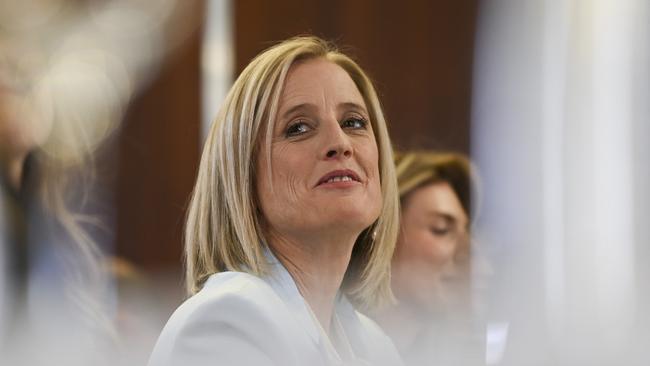Super on taxpayer-funded paid parental leave doubles in cost to $430m
Labor’s commitment to pay super on top of taxpayer-funded paid parental leave could cost about $430m in its first year, double earlier estimates, as Katy Gallagher refuses to provide costings.

Labor’s commitment to pay super on top of taxpayer-funded paid parental leave could cost about $430m in its first year, making it twice as expensive as previous estimates.
Finance Minister Katy Gallagher, who is also Minister for Women and announced the long-awaited plan on March 7, has refused to give any costings to go with its commitment ahead of the May budget.
Super lobby group ASFA, which supports paying super on government-funded PPL, estimated in March last year that the policy would cost $200m annually. This echoed Treasury costings in 2020, which assumed only 18 weeks of paid leave, a super guarantee rate of 9.5 per cent, and a minimum weekly wage rate of about $750.
If the minimum wage rate increases in line with Treasury’s inflation forecasts, however, parents will receive a weekly income of $940 for 24 weeks by mid-2025, suggesting about $4.1bn in PPL for 180,000 families in 2025-26.
By then the super guarantee will have reached 12 per cent, meaning super paid will be a little under $490,000.
Assuming 80 per cent of recipients have high enough incomes to pay the 15 per cent super contribution tax, then paying super on government PPL will cost taxpayers roughly $430m in its first year.
Ben Phillips, associate professor at the ANU’s Centre for Social Research and Methods, said at those levels, the PPL policy would be one of the bigger measures in the May budget.
Mr Phillips, who is on the government’s Economic Inclusion Advisory Committee, said there was a strong policy case to address the wide retirement savings gap between men and women. But he said paying super on top of taxpayer-funded parental leave for six months would not be a “gamechanger”. He suggested the money could be put to better use via, for example, additional assistance for working-age welfare recipients.
“It’s partly good policy, partly symbolic,” Mr Phillips said. “It will help women when they retire to a very, very small degree, but it is righting a policy wrong. If you are replacing the wage, you should replace super as well.”

Senator Gallagher said at the National Press Club last month the policy would be substantially more expensive than previous estimates of $200m. “It’ll be a significant investment in the budget … in the order of hundreds of millions of dollars,” she said.
The gender pay gap and the extra time off from work to care for children meant the average woman in 2020 retired with $139,000 in superannuation savings, or nearly 25 per cent less than an average $181,000 for men, according to the latest tax office statistics.
Labor had long flagged its intention to pay super on taxpayer-funded PPL, and was close to including it in last year’s budget.
Jim Chalmers has signalled that the May budget will include modest additional cost-of-living support, which is most likely to come in the form of additional subsidies to take the pressure off major household bills such as electricity.
The Grattan Institute has recommended that last year’s 15 per cent boost to commonwealth rent assistance should be increased to 40 per cent, at an annual cost of about $1.2bn a year. Housing Minister Julie Collins on Sunday morning would not be drawn on whether the government was prepared to do more to assist low-income renters directly.







To join the conversation, please log in. Don't have an account? Register
Join the conversation, you are commenting as Logout